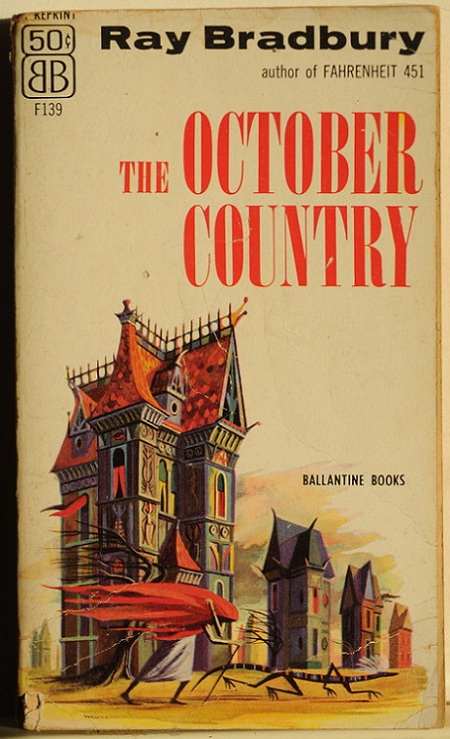OCTOBERFEAST – The October Country

[OCTOBERFEAST is the greatest celebration of the year, a revelry dedicated to pop-culture’s most nutritious Halloween detritus. Plastic screams and artificial sweeteners have never been more bountiful. In the old country, villagers refer to the extended party as Satan’s Snacktime]
It is with the utmost respect and admiration that I present the following declaration:
Ray Bradbury is the official writer laureate of OCTOBERFEAST. The awarding of this position to Mr. Bradbury shouldn’t shock or surprise a single soul, as his work is the printed embodiment of the annual fright-festival. The bizarre, the ghastly, and the speculative synergize to convey a sense of wonder and possibility.
This year’s gala features Ray Bradbury’s The October Country.
Originally published in 1955, this anthology presents nineteen short stories. Unlike some of Bradbury’s other collections, these tales are self-contained. While I’m definitely a sucker for frame narratives, being able to read a single adventure was gratifying in its own right. Granted, I often found myself blowing through two or three at a time, but there were times in which I was able to get a quick fix before heading back to the drab reality that is daily living.
With that being said, there is a pervasive atmosphere in all of the contained texts. Sometimes this cloud is only detectable as delicate gray wisps. At other times, the reader is engulfed by a fog that stings the eyes and fills the lungs. But at no point can an individual visiting The October Country shake the feeling that there are unseen forces at work. Elements that cannot be understood. Qualities that are perceived only in the dark, innermost regions of the subconscious.
This is a book for autumn, that time of the year in which beauty flourishes and life dwindles.
In a prelude to the stories, the author describes his vision of the titular landscape:
“That country composed in the main of cellars, sub-cellars, coal-bins, closets, attics, and pantries faced away from the sun. The country whose people are autumn people, thinking only autumn thoughts. Whose people passing at night on the empty walks sound like rain…”
Tell me that’s not damn poetic. I’ll ask you to step outside.
I think one of the best representatives of this book is The Jar. In this yarn we meet a man named Charlie who is down-on-his-luck in more ways than he can count on a single hand. He’s the laughingstock of his small town, he’s overshadowed by his cousin Tom, and he strongly suspects that his wife Thedy has been maintaining a regular rendezvous with said relative. Charlie takes a trip to a carnival and becomes so engrossed by a jar containing some sort of preserved abomination that he won’t leave until he purchases it.
Bringing home the jar, Charlie is finally respected by the townsfolk; they visit nightly to socialize and surmise what the contents may be. Some think it’s a dead kitten. Others believe the jar to contain human parts. But the enjoyment isn’t in knowing, but guessing. Unfortunately, Tom and Thedy set to ruin Charlie’s fun by speaking with the carny from whom the jar was appropriated. But by the end of the story, Charlie has struck back against his tormentors and filled the jar with…well, something else.
Another must-see site of The October Country is The Scythe. Drew Erickson is driving around his family around the country in a beat-up car, hoping to improve their bleak prospects. They are poor, starving, and without a place to stay. Then, as though directed by providence, he discovers a picturesque farmhouse. Once inside, however, he discovers a deceased old man with a note bequeathing the farm to whoever comes across it first. Drew is skeptical, but sees no other feasible way of helping his family.
All is well until Drew feels himself being drawn to the idea of using a particular scythe to tend a particular field of wheat. He obliges, but notices that whatever he cuts grows back at an astounding rate. When he tries to refrain from the work, he can’t help but feel that all is not right with the world. In a sense, he is now consumed by a sense of global responsibility.
Eventually, Drew comes to the conclusion that he has now assumed the role of that infamous scythe-wielder. After a particular tragedy, he stops resisting and basks in the glory of his job:
“The blade swung insanely.
And the kilns of Belsen and Buchenwald took fire.
The blade sang, crimson wet.
And mushrooms vomited out blind suns at White Sands, Hiroshima, Bikini, and up, through, and in continental Siberian skies.
The grain wept in a green rain, falling.”
The October Country is a book that uses fantastic ideas to pull familiar heartstrings. In a sense, it is the perfect tome for OCTOBERFEAST as it celebrates the real love of life by summoning the fictional demons of our wildest fancies.
For your entertainment – the Ray Bradbury Theater adaptation of The Small Assassin:



